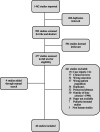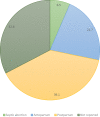Outcomes and management of pregnancy and puerperal group A streptococcal infections: A systematic review
- PMID: 36636775
- PMCID: PMC9889326
- DOI: 10.1111/aogs.14500
Outcomes and management of pregnancy and puerperal group A streptococcal infections: A systematic review
Abstract
Introduction: Group A streptococcus (Streptococcus pyogenes) is one of the most lethal bacterial pathogens of humans, with increased risk of progression to septic shock and multiorgan failure in the pregnant population. The objective of this study is to systematically review the outcomes and management strategies for pregnancy and puerperal group A streptococcus infections in an effort to provide further guidance for prevention and treatment of a rare but lethal infection worldwide.
Material and methods: A comprehensive search using puerperium and streptococcus pyogenes terms was completed across several registered databases. A total of 902 articles investigating pregnancy and puerperal group A streptococcus infection were identified, with 40 studies fulfilling inclusion criteria of original research articles in humans published from 1990 onwards reporting four or more unique cases of group A streptococcus in pregnancy or postpartum. This study was registered in PROSPERO: CRD42020198983.
Results: A total of 1160 patients with pregnancy and puerperal group A streptococcus infection were identified. Most infections occurred postpartum (91.9%), with 4.7% reported antepartum and 0.6% intrapartum. Bacteremia was present in 49.0% of patients and endometritis in 45.9%. Puerperal sepsis was described in 28.2% of cases and progressed to streptococcal toxic shock syndrome in one-third of such cases. Overall, the case fatality ratio was 2.0%, with one-third of the deaths from antenatal cases including 3/22 (13.6%) cases of septic abortion and 10/46 (21.7%) antenatal cases of group A streptococcus infection.
Conclusions: Group A streptococcus infection remains an important contributor to pregnancy and puerperal morbidity and mortality. Early recognition, diagnosis and aggressive management are important for favorable outcomes given the serious risk of sepsis and streptococcal toxic shock syndrome.
Keywords: Streptococcus pyogenes; group A streptococcus; pregnancy; puerperium.
© 2023 The Authors. Acta Obstetricia et Gynecologica Scandinavica published by John Wiley & Sons Ltd on behalf of Nordic Federation of Societies of Obstetrics and Gynecology (NFOG).
Conflict of interest statement
None.
Figures




References
-
- Say L, Chou D, Gemmill A, et al. Global causes of maternal death: a WHO systematic analysis. Lancet Glob Health. 2014;2:e323‐e333. - PubMed
-
- Tuffnell D, Rodger A, Lucas N, Lucas S, Knight M, MBRRACE‐UK Sepsis Chapter‐Writing Group . Messages for prevention and treatment of infection. In: Knight M, Bunch K, Tuffnell D, et al., eds. Saving Lives, Improving Mothers' Care ‐ lessons learned to inform maternity care from the UK and Ireland confidential enquiries into maternal deaths and morbidity 2016‐18. National Perinatal Epidemiology Unit, University of Oxford; 2020:64‐70.
-
- Kramer HMC, Schutte JM, Zwart JJ, Schuitemaker NWE, Steegers EAP, van Roosmalen J. Maternal mortality and severe morbidity from sepsis in The Netherlands. Acta Obstet Gynecol Scand. 2009;88:647‐653. - PubMed
Publication types
MeSH terms
LinkOut - more resources
Full Text Sources
Medical

